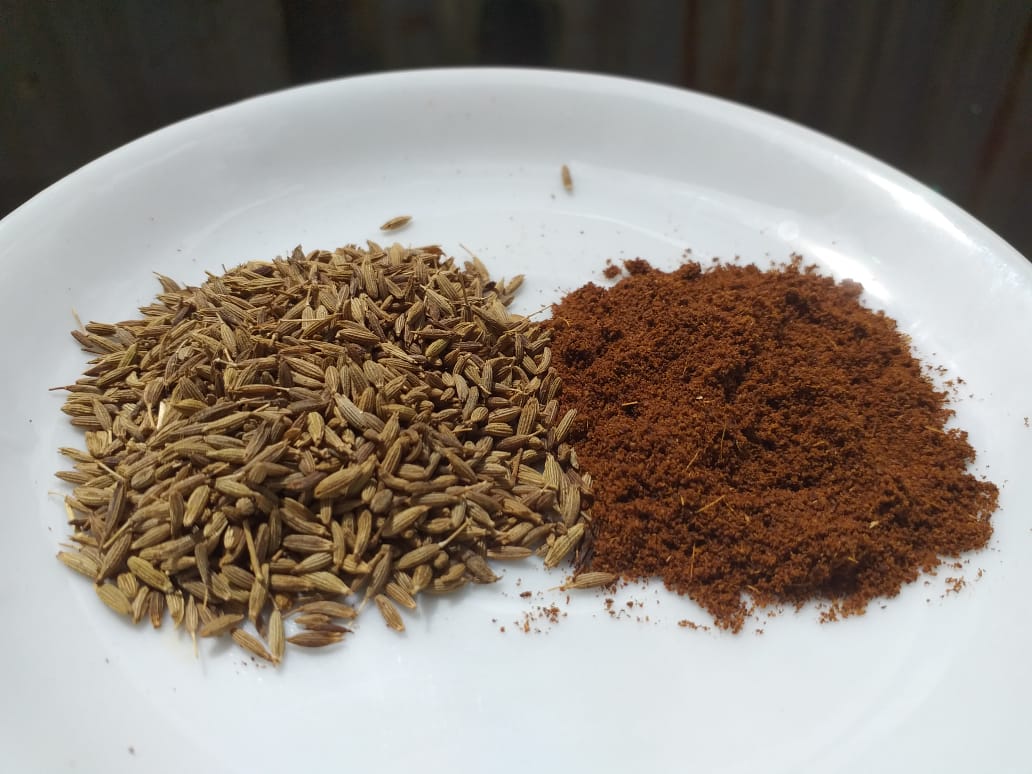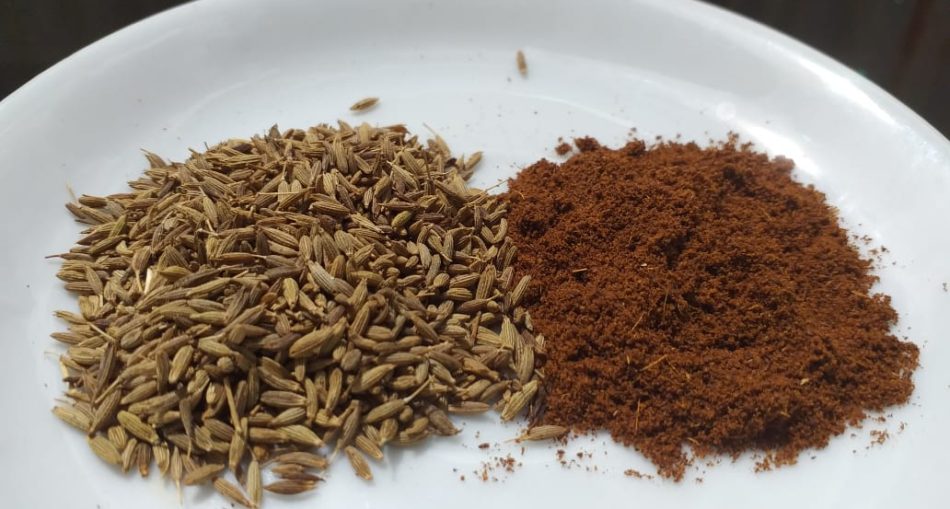Cumin or Geera as it is known in locally is obtained from the Cumin herb which produces numerous tiny seeds. These aromatic seeds are used ground or raw as a spice to favour many foods like stew, bread, cheese and soups like dhal. To extract optimal flavour, the seeds need to be toasted perfectly.
The scientific name of the Cumin herb is Cuminum cyminum but it is known by several other names. In India, it is called zeera, very similar to the word ‘geera’ which it was probably changed to when the East Indian indentured labourers came to Guyana. In other countries, Cumin is called kummel, comino, zirech-e sabz, cumino, kemon, zira, and kamun.

Raw & Ground Cumin (Geera) – Photo By Sarika Prasad
Origin of Cumin
Cumin or is native to the eastern Mediterranean region and south-west Asia. It is native to Egypt, Iran and India which produces ninety percent (90%) of the words Cumin.
Description Of Cumin
The Cumin plant (Cuminum cyminum) from which we get the Cumin seeds, reaches a height of thirty to fifty (30–50) cm. This annual, herbaceous plant has a lean, dark green and smooth stem about twenty to thirty (20–30) cm in height with a diameter of three to five (3-5) cm. Every branch consists of at least two (2) subbranches. Because all branches reach the same height, the plant’s canopy is consistent. Leaves are pinnate, five to ten (5-10) cm long with thin leaflets. Flowers of the Cumin plant are either white or pink, small and with inflorescences consisting of numerous flower stalks. They are ovoid about four to five (4-5) mm long and tapered at both ends, containing two mericarps with one seed. Fruits are achene, meaning they do not open to release the seed. The seeds are ridged lengthwise, generally having eight ridges with oil canals and yellow or brown in colour.
Nutritional Facts Of Cumin
One hundred grams (100g) of Cumin seeds provide high amounts of the Daily Value for fat protein, and dietary fibre, vitamin B Complex, Vitamin E. It also contains minerals, especially iron, magnesium, and manganese.
Culinary Uses of Cumin
- In the Netherlands, the Dutch make a special type of cheese with Cumin seeds called Leyden cheese.
- Cumin seeds are also used in the making of some traditional bread in France.
- Cumin seeds are considered a spice and as such, it is added to many spice blends like garam masala, curry powder, and even Mexican-style chilli power.
- Combined with coriander seeds, Cumin seeds makes a powder called dhana jeera in South Asia. It is also used in some pastries and pickles.
Traditional Uses of Cumin
- Made into a powder, Cumin seeds are used in a number of ways including kashaya (decoction), arishta (fermented decoction), and vati (pills or tables), and processed with ghee (a semifluid clarified butter).
- The dried Cumin seeds are believed to have medicinal purposes and in some southern states in India drink known as ‘jira water’ is made by boiling the seeds.
Other Uses of Cumin
- There are several components in Cumin oil like cuminaldehyde, cymene, and terpenoids used for flavours, perfumes, and even essential oil.
- In some casesCumin oil is an ingredient in some cosmetics.
Here Are 9 Magnificent Healthy Benefits Of Cumin
- Contains antioxidants – Natural substances apigenin and luteolin protect healthy cells from the attack of free radicals.
- Anti-cancer properties – Studies have shown that Cumin may be able to prevent cancer cells from multiplying.
- Treats diarrhoea – In traditional medicine practitioners, Cumin has been used to treat diarrhoea.
- Control blood sugar – Cumin is known to help diabetics manage their condition.
- Kill bacteria and parasites – Oil from Cumin seeds works as an effective larvicide and antiseptic agent in addition to killing antiseptic-resistant bacteria strains.
- Anti-inflammatory properties – Cumin essential oil and the seeds themselves are believed to reduce pain and inflammation properties.
- May lower cholesterol levels – Hypolipidemic properties in Cumin helps to control the high levels of fat in your body which contribute to heart problems.
- Improves symptoms of Irritable Bowel Syndrome (IBS) – Cumin extract is able to treat symptoms of IBS including cramps, digestive spasms, nausea, and bloating.
- Improves memory – Cumin helps to stimulate the central nervous system, which can improve your memory.
About Cumin
Cumin, or Geera is one of the old spices in the world noted for its warm, sharp earthy flavour. It is one of the main species in the Indian masala used in combination with curry powder to prepare curry, in fact no Guyanese curry is complete without some Cumin.
Article References
- https://en.wikipedia.org/wiki/Cumin
- https://www.healthline.com/health/cumin-benefits#benefits
- https://www.sciencedirect.com/topics/agricultural-and-biological-sciences/cuminum-cyminum#:~:text=Cumin%20(Cuminum%20cyminum%20L.),-Oils&text=Cumin%2C%20Cuminum%20cyminum%20L.,the%20world’s%20production%20from%20India.
Discover more from Things Guyana
Subscribe to get the latest posts sent to your email.







